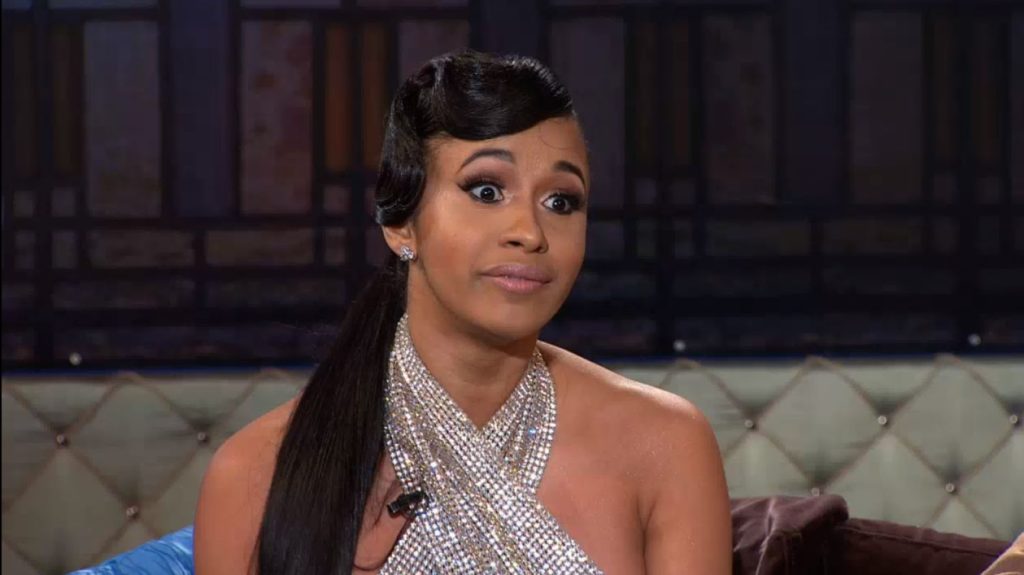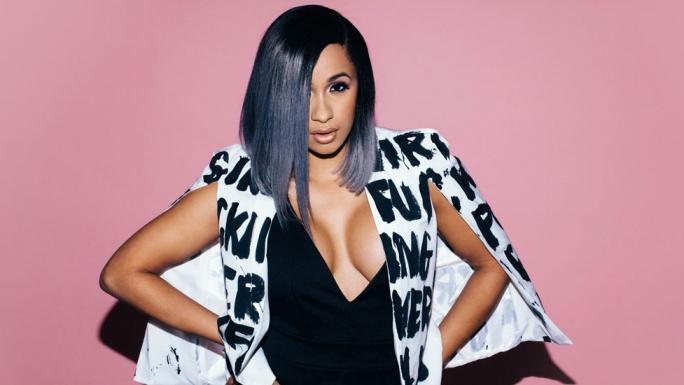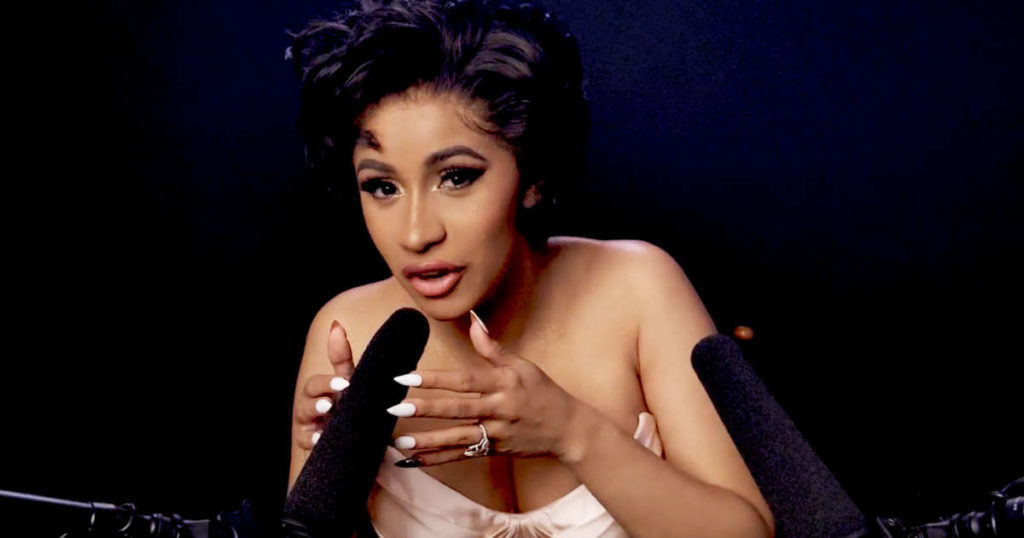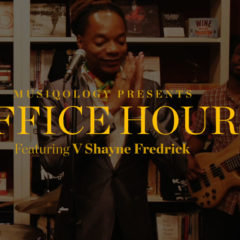From Izzy Lopez, a Penn undergraduate student, comes this new and thoughtful look at Cardi B, the woman who has taken over the music industry and popular culture zeitgeist in tandem. Lopez asks why media narratives of Cardi’s rise wind up feeling so formulaic–arguing that a broader discomfort with her is connected to intersectional issues of race and gender in media more broadly. As long as she remains held at arms’ length, celebration of her success will always carry with it baggage that reduces her humanity.
Since she burst onto the music scene in 2016, Cardi B has been a seemingly unstoppable force. In only two years, the singer famous for chart-toppers such as “Bodak Yellow” and “Finesse” has ascended from Love & Hip-Hop New York reality show personality to the first female rapper to have three no. 1 singles on the Billboard Hot 100 charts. Cardi–real name Belcalis Marlenis Almánzar–continues to rack up award nominations and wins, at the same time dominating pop culture with her brash and electric personality. Cardi B is making an unmistakable impact in music industry and popular culture circles. She also complicates and nuances conversations around monolithic notions of race in hip-hop, carrying her New York Latina identity with pride and using it sonically on tracks such as her bachata-inspired single “I Like It”. She confounds interviewers with her stream-of-consciousness storytelling, ruthless honesty, and on-brand vocal eccentricities. As Cardi B solidifies her place in music history, the story of Cardi has been inscribed on countless platforms. From Rolling Stone to Time, everyone is fascinated by Cardi.
Read any story on Cardi B and you’ll likely see the same elements of her origin story that journalists have decided are fundamental to “understanding” Cardi. These elements are usually: she’s from the Bronx, her stage name comes from Bacardi rum, she worked in a strip club at 19, she got butt implants in a basement in Queens, she’s a former star of Love & Hip Hop: New York, and most of all she is known for “speaking her mind” at all times.
There is value in sharing Cardi B’s story. She embodies the rags-to-riches narrative that flows through hip-hop stardom and she has leapt from reality TV to record-setting artistic career in only a few years. This context–how she became Cardi B–is of course important, and any artist has an origin story that feeds their personal brand. And for many, this is an encouraging brand: Progressive media says it’s pushing for greater inclusion and representation in the entertainment industry, and Cardi B is that representation.
But the problem with that deconstruction is distance–the media holds her at arms’ length, making her into a symbol rather than a person. They do this presumptuously–as if to make her more palatable for their audience–and they gawk at her origin story as a hip-hop spectacle rather than a woman’s lived experience. This begs the question: How is the narration of her origin story a symptom of the media’s discomfort with a multi-racial, sex-positive woman who actively pushes back against representational norms? Why is it so difficult to envision her as more than just the sum of her most controversial parts?
This is not for lack of trying. Cardi B reporting inevitably includes clumsy binary splits between “the Cardi we see” and “the Cardi we don’t see,” as if this dichotomy is the only way to understand her. For every thoughtful article covering her persona and career, there is an equally useless, floundering attempt to reconcile the person behind Cardi B. She is seen in two “scenes,” to take a page from journalistic parlance: Cardi on stage, dressed in revealing costumes, twerking, swearing, and cheering with the crowd, and Cardi at home, wig off, legs tucked underneath her as she rests on her grandmother’s couch in Washington Heights. The former is a hero for sexual liberation or a Jezebel. The latter is a “true” representation of who Cardi “really is”, a simpler, docile, tame image. It appears that the music world can not seem to suture these two images of Cardi B into one. We insist on separating her into pieces and we continue to deny Cardi B her naturally human complexity.
Rolling Stone, for instance, writes, “In her songs, she may seem like a 24/7 bad bitch, but today, her face scrubbed clean of makeup and unbrushed, Rapunzel-like blond wig hanging to her waist, she’s a curious combination of raunchy extrovert and angst-plagued introvert.” Here we can clearly see the dichotomy that Cardi B is forced into. Sure, she performs all things sexual liberation and female domination, but, really, truly, the real Cardi is just like you and me. She has a home too, and a family. Knowing this, it is safe to like her music and, by extension, her. “Normalizing” her makes her commitments seem a performance. The “real” Cardi is lying just behind the scenes.
Considering Cardi B’s historic commercial success and massive audience appeal, why then, is her story split into a binary of sexual versus domestic, braggadocious vs humble, bad example versus good example? Why are we unable to speak about Cardi B without rationalizing our enjoyment of her music by saying “she’s not like that all the time?” Why can’t she be both?
The answer to this question is as complicated as the music industry itself. Certainly, Cardi B is a good for the music industry. She signed a major deal with Atlantic records. She attracted brand attention from Amazon and Fashion Nova. She’s broken Billboard records and her ever-growing Instagram and Twitter followers, known as the #BardiGang, ensure an audience for all things Cardi. She is praised endlessly for her “authenticity” and yet reporters continue to construct a narrative that insists on domesticating her as to make her brash performances more palatable.
The fact is, the music industry has yet to build a place for performers like Cardi B. While sexism in the music industry affects all women, it doubles down on minority women and denies them their human complexity: They’re either slut-shamed or held up as testaments “good for the race.” The music industry sees black and brown performs as members of a minority community rather than individuals. As a result, their unique character is reduced to an impossible binary of good or bad. Unsurprisingly, much of this good or bad judgment stems from performed sexuality.
This isn’t new, either: The music industry was built on exploiting women’s bodies for profit by separating their sexuality from their humanity. Cardi B plays that game, too, as she chose to get breast and butt implants on her own, not at the cajoling of a manager. This, too, is part of her own narrative, not one written onto her. As a result, the culture industry that knowingly profits off black and brown women’s bodies finds itself scrambling to understand how Cardi B can exist as both a sex symbol and an entirely human woman who enjoys the company of family, raises a child, and dares to be domestic. The way they narrativize her sustains both simplistic representations: of sexual provocateur and “normal,” sedate homebody. In this ensnaring binary, Cardi B is never fully human. She is broken into parts, and the fragments of her story manipulated into yet another cover story that says the same thing: we can not fathom a woman of this complexity and so we must reduce her into something we can understand.
At 26, she is a record breaking rapper, sex-positive icon, wife, and mother. Despite the current coverage of her, she is all of these things combined, not compartmentalized. We must continue to push for complex representations of Black and Latina women because if we deny them their multitudes then we degrade the very person we claim to support. Supporting their music helps, advocating for representation in music helps. But allowing, and embracing, an artist’s complex humanity is the best tool we have for overcoming intersectional racism and sexism in the music industry today.
Izzy Lopez is a writer and student at the University of Pennsylvania, majoring in English. Her essays have appeared in The Red Cedar Review, r.kv.r.y. quarterly literary journal, and her poetry has been featured in The Penn Review, and F-Word Magazine. Beyond the page, Izzy is a playwright whose play, Four Weeks, was produced in the 2016 Philly Fringe Festival. Izzy’s work centers around interpersonal relationships and what it means to be human. Visit her website: www.izzydlopez.wordpress.com to read her published work.




 Share On Facebook
Share On Facebook Tweet It
Tweet It








